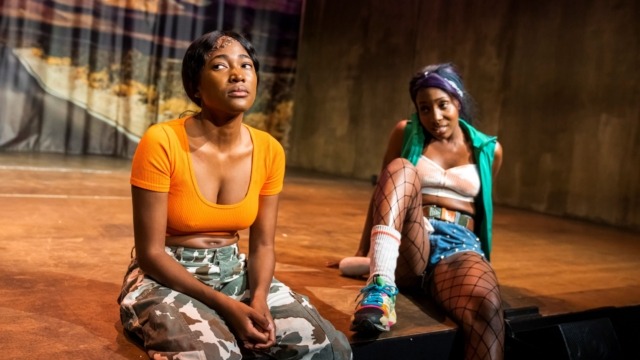‘Is God Is’ review: Spaghetti Western meets Tarantino
Good things come better in pairs. Shoes, socks, cutlery, and according to Aleasha Harris, serial killers.
Harris’ Tarantino-esque tragicomedy, Is God Is, follows 21-year-old twins Racine and Anaia on their journey of bloodsoaked vengeance, from the Dirty South to the California desert. In this play that pairs ancient tragedy with spaghetti western, Harris is not afraid of her biblical allusions, from jokes about Cain and Abel to antiquated murder weapons (a rock in a sock). Harris applies the Old Testament belief that ‘two are better than one’, to these murderous sisters, for if one falls, the other helps her up, or, in this case, finishes the deed herself. Think Bonnie and Clyde, except siblings not lovers, and with part of the play taking place in the ‘Dirty South’ this distinction seems necessary.
In this play that pairs ancient tragedy with spaghetti western, Harris is not afraid of her biblical allusions, from jokes about Cain and Abel to antiquated murder weapons.
Tamara Lawrance (Racine) and Adelayo Adedayo’s (Anaia) deadpan deliveries of Harris’s wicked humour perfectly capture the essence of this twisted tale. The best example being their reoccurring, expressionless response “damn”, used even when their formerly presumed-dead mother requests they “make [their] dad dead…all the way dead”. Cecilia Noble is formidable as their mother, or God because “she made us, didn’t she?”, sitting upright in her throne-like hospital bed, eyes glaring out from her dry, scalded skin. Thanks to Susanna Peretz’s detailed special effects makeup and Noble’s great comedic instinct and brilliant projection, the audience experiences a chilling account of the inciting incident that triggered such fury from these scorched women.
Since its Off-Broadway premiere in 2018, critics have described Harris’s play as Spaghetti Western meets Tarantino, because of its revenge plot and gratuitous violence. However, under Ola Ince’s direction, this connection is made through using other features such as title cards and atypical use of music. Ince embraces Harris’s inspirations both musically, through the input of composer Renell Shaw – who has worked with Skepta, Maverick Sabre, Rudimental – and his film-like soundtrack combining hip-hop with opera and trap with spaghetti western whistles, and visually, with Chloe Lamford’s eccentric, stylised sets and the informative title cards for each scene.
The physical violence was messy, scrappy at best, but this is part of its charm.
The bold instincts that informed Ince’s contemporary, trigger-warned Romeo and Juliet at The Globe Theatre this summer, are apparent in this production. Interviewing with the Evening Standard, she audaciously displayed her absurd, unfeeling approach, as she remarks “it feels really weird to say the play is violent”. But with such a sizable body count in the space of 90 minutes, the violence in this play packs a punch, as well as a stabbing, multiple rock-in-a-sock bludgeonings, and some choking too.
The physical violence was messy, scrappy at best, but this is part of its charm. These twins are not trained assassins, they are just trying to avenge their mother and get some payback for the scars crawling up their necks to remind them of their father’s abuse. And if this meaning didn’t reflect in the violence, as Ince intended, at least the slapstick element had this audience in fits.
Yet amidst this laughter, the path to patricide started to seem nonsensical. This was particularly glaring with their father’s new family and the other set of twins. These various comical performances, such as Ernest Kingsley Junior’s portrayal of wannabe poet/casanova Scotch, and Rudolphe Mdlongwa as arugula-loving ‘soft boi’ Riley had the audience roaring with laughter, and except for the symbolic symmetry of their burning, these deaths felt unkind and unnecessary.
This production could have benefitted from being a little more “all emotional”, as well as comical, to have audiences squirming as well as chuckling in their seats.
These Scary Movie-esque, parodied murders couldn’t distract from Ince’s rather fast-paced production, and how despite this speed, the senseless murdering started to drag. That is until the patriarch finally makes an appearance. ‘Man’ (Mark Monero) enters, removing his corporate suit to vintage western whistles and a fading bass track (from the previous stripping scene), to reveal a tacky cowboy belt, boots and hat. The audience is reminded of this play’s ingenious absurdity as Monero’s slow-motion strip tease resembles a more twisted, homicidal Magic Mike act. As the giggling dies down, the audience waits with bated breath during the ‘Showdown’. Violence inevitably ensues and the well-designed stage set alight, providing many opportune moments for collective, audible gasps.
However, this long-awaited reunion left me feeling unsatisfied: Adedayo’s remarkably haunting performance in the scene “Twin?” captured my discontent as I was now “too tired for this”. As the play comes to a close, her performance is what shines. The running joke that Anaia will “be all emotional”, unlike her cut throat other-half, is precisely what has the audience so uncomfortably rooting for her. This production could have benefitted from being a little more “all emotional”, as well as comical, to have audiences squirming as well as chuckling in their seats, and to successfully make them “fall in love with the girls and their mission” as Ince intended.
At Royal Court, Jerwood Theatre Downstairs, London, until 23 October.

Comments